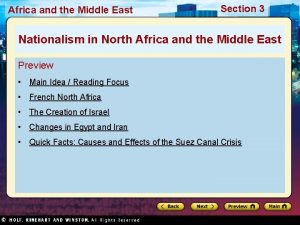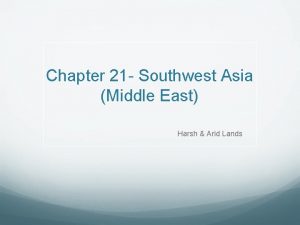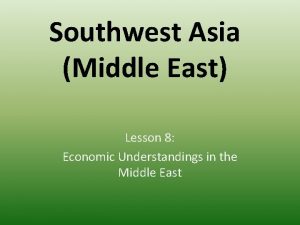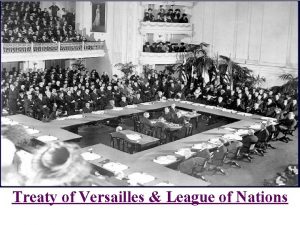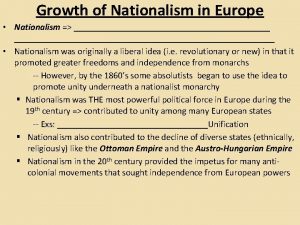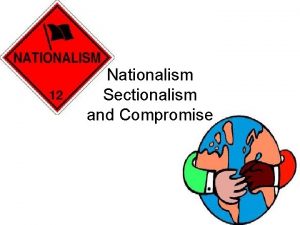POLITICS OF THE MIDDLE EAST Arab Nationalism Arab

POLITICS OF THE MIDDLE EAST Arab Nationalism

Arab League

Arab Nationalism � � � Ligue de la Patrie Arabe (1904, Paris) Arab League Society (Cairo, 1910) The Young Arab Society (Paris, 1911) Beirut Reform Society (1912) Arab Congress (Paris, 1913)

Pan Arabism � � � “unite all the Arabic- speaking peoples within a single country. ” Arab specific doctrine of liberation End of Western influence Removal of Arab governments dependent on the West Secular state informed by Islamic principles

Attempts at Arab Unity � 1958 – 61: United Arab Republic � (Syria � 1958: Arab Federation � (Iraq � , Egypt, N. Yemen) and Jordan) 1972 – 77: Federation of Arab Republics � (Libya, Egypt, Syria)

Consequential Events for the Pan Arab Cause � � � 1956 Suez Crisis, Egypt 1962 – 70 North Yemen Civil War 1967 Six Day War 1973 October War 1978 Camp David Agreement

Arab Cold War Republics vs Monarchs � � Revolutionary Republics Egypt, Iraq, Syria � � Conservative Monarchies Saudi Arabia, the Gulf Kingdoms

Egypt, Nasserism � Three Circles Theory: � Arab � African � Islamic � Ideology � Socialism � Independence � non-alignment � Arab unity under Egyptian hegemony

Syria and Iraq: Bathism � � � Promoted a progressive revolutionary approach to Arab nationalism Michel Afleq Neither communist nor capitalist Arab Political Unity Secularism Recognition of Islamic contributions

The Neo Ba’athist � Privileges a Vanguard party rather than Progressive revolution, essentially authoritarian

� https: //www. youtube. com/watch? v=0 fswb 4 a 9 jc U

� The success of Nasserism depended upon 4 conditions � 1) advanced weaponry � 2) healthy, independent economy � 3) ideology of transnational appeal � 4) influence on the world stage � 5) Exploiting Super Power competition � � Avoid dependence on either of the competing powers Egypt belonged to no defense pact, hosted no foreign bases, and professed neither capitalism nor communism

Suez Crisis � � � 1951 Anglo Egyptian Treaty abrogated 1956 Egypt nationalizes the canal zone Military response by UK, France, Israel � Objectives: Retake Suez and overthrow Nasser


Ending the Crisis � � Diplomatic Pressure by US, USSR, UN forced withdrawal of UK, France US blocked UK IMF loans and threatened Israel with sanctions Saudi Arabia oil embargo on UK, France Canal re-opened April 1957 after the last IDF troops left Egypt

North Yemen Civil War - 1970 � � 1962 September 1962, coupe in Sana Military officers succeeded in overthrowing the Imamate, a dynastic institution of Zaydi religious rulers. 1962 – 1967 Egypt intervened resulting in a Republican victory Over stretched Egyptian resources meant that was Egypt unable to fully commit to either Yemen or Israel in 1967, jeopardizing its role in the Six Day War

Six Day War 1967 � � Crushing defeat for the Arab coalition Loss of Sinai Peninsula Demonstrated the limits of Arab cooperation Casualties � Israel 1000 � Arab Coalition 20, 000

Before and After the Six Day War

Death of Nasser 1970

October War 1973 � � Surprise attack by Egypt and Syria during Yom Kippur Aggression ends in Arab defeat but demonstrates Israeli vulnerability

Camp David Agreement � � � Recognition of Israel Formal Diplomatic Relations Return of the Sinai to Egypt Transfer of Authority in Gaza and West Bank End of Israeli settlement

End of the Arab Cold War � � � Republics vs Monarchs, replaced by sectarian divisions The failure of Pan Arabism leaves a void in the unity narrative Islam resurges as a unifying political force

- Slides: 23
